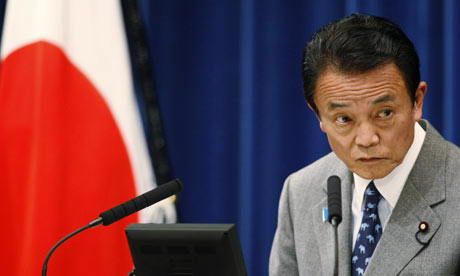Japanese unemployment hits three-year high
• Japan's jobless figure nears 3m after 12.4% rise in the last year
• Prime minister, Taro Aso, draws up third stimulus package in six months
- guardian.co.uk, Tuesday 31 March 2009 10.46 BST
-
 larger | smaller
larger | smaller - Article history

Japanese prime minister Taro Aso tells reporters in Tokyo that he will unveil a new stimulus package at the G20 summit in London. Photograph: Yoshikazu Tsuno/AFP/Getty Images
Unemployment in Japan rose to its highest level in three years last month as firms reduced recruitment and laid off tens of thousands of temporary workers.
The jobless rate rose by 0.3% to 4.4% in February, according to government figures, pushing the number of jobless to 2.99m. The total has risen by 330,000 in the last year, a 12.4% increase.
The growing army of unemployed are chasing fewer jobs. The labour ministry said the number of positions available per applicant had fallen from 0.59 to 0.67 last month, the biggest drop for 35 years.
The gloom among consumers worried about job cuts has also deepened, with data showing that household spending fell by 3.5% in February, the 12th monthly decline in a row.
That, along with record slides in industrial output, plunging retail sales and woeful export figures, has prompted the prime minister, Taro Aso, to draw up his third stimulus package in six months in a desperate attempt to soften the blow of Japan's worst recession since the end of the war. Aso is expected to unveil the plan at the G20 summit in London this week.
Dramatically weakened exports have forced major exporters to reduce job opportunities in an attempt to cut costs. Toyota, the world's biggest carmaker, will halve graduate openings to the lowest level in 14 years as it braces itself for its first loss in almost 60 years. Sony, Hitachi, Toshiba and NEC will also reduce new graduate intake for the coming fiscal year.
The finance minister, Kaoru Yosano, today admitted the scale of Japan's economic woes had taken the government by surprise.
"[There is] a huge gap between the current situation and our economic outlook when the current budget was drafted only three months ago," he said.
The government is reportedly preparing to issue deficit-covering bonds to fund the new measures, which are intended to create 2m new jobs.
Yosano conceded urgent action was needed "to stop the economy sinking deeper into recession and prevent social tragedies such as unemployment, employment instability and corporate bankruptcies".
The new package, rumoured to be worth ¥20tn (£142bn), would come on top of ¥75tn, including ¥12tn in public spending, announced last year.
Japan's economy, which is heavily dependent on exports, shrank 3.2% in the fourth quarter, its fastest decline since the oil crisis of 1974 and twice as fast as the US and eurozone economies.
Factory output fell 9.4% in February after a record 10.2% fall in January; figures out last week showed that exports nearly halved last month.
With little sign of demand picking up at home or overseas, economists fear Japan's economy will continue to shrink over the first half of this year. In addition, a Bank of Japan survey out tomorrow is expected to show business sentiment at a record low.
Temporary workers are bearing the brunt of the latest round of redundancies. Between October last year and June this year, more than 190,000 will have lost their jobs, according to official estimates. More than 36,000 temporary workers lost or expected to lose their jobs in March alone, 90% higher than projected a month earlier.
Job creation schemes have had little impact and more than 75% of the recently unemployed have yet to receive benefits, the International Labour Organisation said.
Analysts warned unemployment could rise further over the coming months.
"Jobs data tends to lag economic activity, so there's a high chance that the unemployment rate will deteriorate rapidly and it's likely to rise above 5% this year," said Yoshiki Shinke, a senior economist at Dai-ichi Life Research Institute.
"We can't rule out a rise towards 6% and, in this environment, salaries will fall further. The jobless rate may not peak this year. The outlook for consumption is pretty bad."

No comments:
Post a Comment